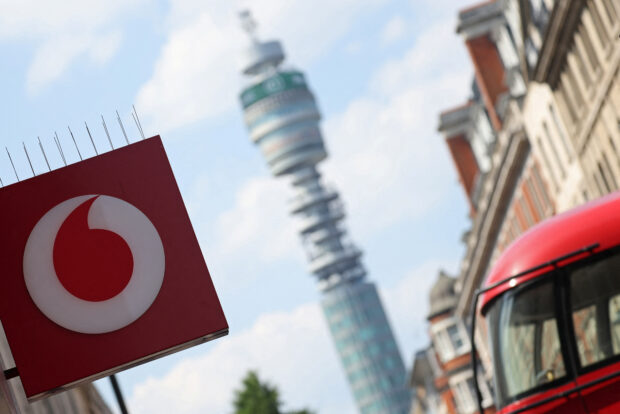Vodafone and Hutchison’s UK mobile merger faces tough test yet

Branding is displayed for Vodafone at one of its stores in London, Britain, June 14, 2023. REUTERS/Toby Melville/ File photo
LONDON -It has taken months of tortuous negotiations for Vodafone and CK Hutchison to agree a deal to create Britain’s biggest mobile operator, but from a regulatory standpoint the hard work is only just beginning.
The $19 billion tie-up will be scrutinized by Britain’s Competition and Markets Authority, the antitrust regulator which made global headlines in April when it blocked Microsoft’s $69-billion acquisition of “Call of Duty” maker Activision Blizzard.
Microsoft’s $69-B Activision deal could harm competition, UK says
The long-awaited mobile deal reduces the number of networks from four to three, challenging a tenet long held by regulators that four help to keep prices low in major markets.
Hutchison tried to buy Telefonica’s O2 network seven years ago, but the deal – already opposed by Britain’s telecoms regulator Ofcom – was blocked by the European Commission on the grounds that it would damage competition. Legal wrangling about that decision continues.
Any UK ruling is likely to take well over a year.
Analyst Paolo Pescatore at PP Foresight said the tie-up will be a hard sale given that both Vodafone and Hutchison’s Three UK have been outperforming the market for the last year or so.
“Both parties need to demonstrate that this is genuinely in the interest of UK plc, the economy, and consumers for it to have a chance of getting over the line,” he said.
Aware of the hurdle ahead, Vodafone and Hong Kong-based Hutchison put the emphasis on an 11 billion-pound 5G plan they pledged to deliver over 10 years for Britain, rather than more profit for shareholders.
Customers will be no worse in terms of bills and will be better in terms of network performance, they said.
Victoria Scholar, head of investment at interactive investor, said securing regulatory approval could be “a tall order given the likely concerns over diminished competition and consumer choice”.
Peter Broadhurst, a partner in the antitrust and competition group at Crowell & Moring, said the CMA had become more interventionist in the last three years. However, he thought it would look for remedies to approve the deal.
“If you want to get 5G then you have to make investment, and at the moment the mobile network operators can’t make the margins in order to be able to afford that investment because they don’t have the scale,” he said.
“Therefore, you have to allow some sort of consolidation.”
The government said in April it wanted to create a pro-investment framework to deliver standalone 5G. There was no “magic number” of mobile operators, it said, although it added that all decisions on consolidation were for the CMA.
Those comments came shortly after a meeting between top Hutchison executives and government officials, sources have told Reuters.
More amenable
James Gray, managing director of Graystone Strategy, said the telecoms landscape had changed over the past few years and that would probably make the CMA more amenable.
“The government’s desire to make the UK a 5G powerhouse requires a lot of investment,” he said.
The CMA, however, showed it was not afraid to assert its independence with Microsoft-Activision, while Europe approved that deal, and its boss Sarah Cardell said in February that the risks from anti-competitive deals should not be understated.
The companies will also need to secure approval under a National Security and Investment Act, which gives the British government powers to intervene in deals that could pose a risk.
One of Britain’s biggest unions, Unite, has already warned that a company so close to China should not have a leading role in telecoms infrastructure.
Three UK boss Robert Finnegan said he did not see any issue because it already complied with security rules. “This is going from 100 percent ownership to 49 percent,” he said.
The timing of the deal could also cause complications, as it comes as millions of British customers on all four networks digest double-digit rises in their bills amid an inflationary environment.
But competition in Britain has been boosted by the mobile virtual network operator (MVNO) and wholesale market, which enables operators like Tesco Mobile and Sky to piggy back on existing networks, Gray said.
One London-based investment banker, who declined to be named, said he put the chance of the deal receiving the green light from regulators at 50 percent.
A major telecoms investor said the deal could be approved, but only with strong remedies, and that could risk undermining its rationale.
They said a likely remedy could be similar to what happened in a four-to-three merger in Germany in 2014, when Telefonica had to sell up to 30 percent of the merged groups’ capacity, allowing up to three new MVNOs to enter the market.
Read Next
Subscribe to INQUIRER PLUS to get access to The Philippine Daily Inquirer & other 70+ titles, share up to 5 gadgets, listen to the news, download as early as 4am & share articles on social media. Call 896 6000.
For all the latest Business News Click Here
For the latest news and updates, follow us on Google News.



